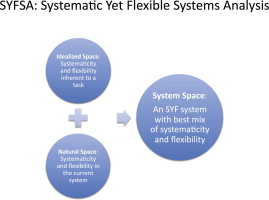Systematic Yet Flexible (SYF) Health IT systems are those that encourage best practices while simultaneously accommodating the tremendous variety of real-world healthcare workflow. Perer and Shneiderman first described the concept of SYF systems using an example of a network analysis tool.
Systematic Yet Flexible Systems Analysis (SYFSA) is a framework developed by SHARPC for designing and analyzing SYF systems. It is based on analyzing a task using three related problem spaces: the idealized space, the natural space, and the system space.
The idealized space represents the best practice. The idealized space for choosing a medication includes a number of constraints, such as that the medication is therapeutically appropriate, has the correct dose and route, is safe, is available for purchase in the form and dose prescribed and within the required time frame, and is as economically efficient as possible.
The natural space captures the task actions and constraints on those actions imposed by the physical world. A paper-based, handwritten prescription enforces almost none of the idealized constraints—it is too flexible. However, this flexibility allows a physician to use non-standard formulations and dosing regimens to better personalize care and to easily prescribe new medications that may not yet be in more systematic IT-based ePrescribing systems.
The system space specifies how the task is done in a redesigned, or newly designed system, including how it may deviate from the idealized space, and how the system supports or enforces constraints in the idealized space. A system space for ePrescribing explicitly considers the constraints of the idealized prescribing space, supports known constraints, while recognizing the need to cope with the inevitable exceptions and variations that are common in healthcare.

We can use SYFSA as a qualitative framework, as demonstrated above, or as an analytical framework. The analytical framework allows us to model alternative designs and calculate several relevant quantitative measures, including flexibility, error or success rates, and mean number of steps to complete a task. Mathematica code to support such analysis is available upon request from Dr. Todd Johnson.
Johnson TR, Markowitz E, Bernstam EV, Herskovic JR, Thimbleby H. SYFSA: A Framework for Systematic Yet Flexible Systems Analysis. Journal of Biomedical Informatics(2013). http://dx.doi.org/10.1016/j.jbi.2013.05.003
A Systematic Yet Flexible Systems Analysis Framework
A Mathematica notebook containing code to automate SYFSA analysis is available upon request. Please email Dr. Todd Johnson.